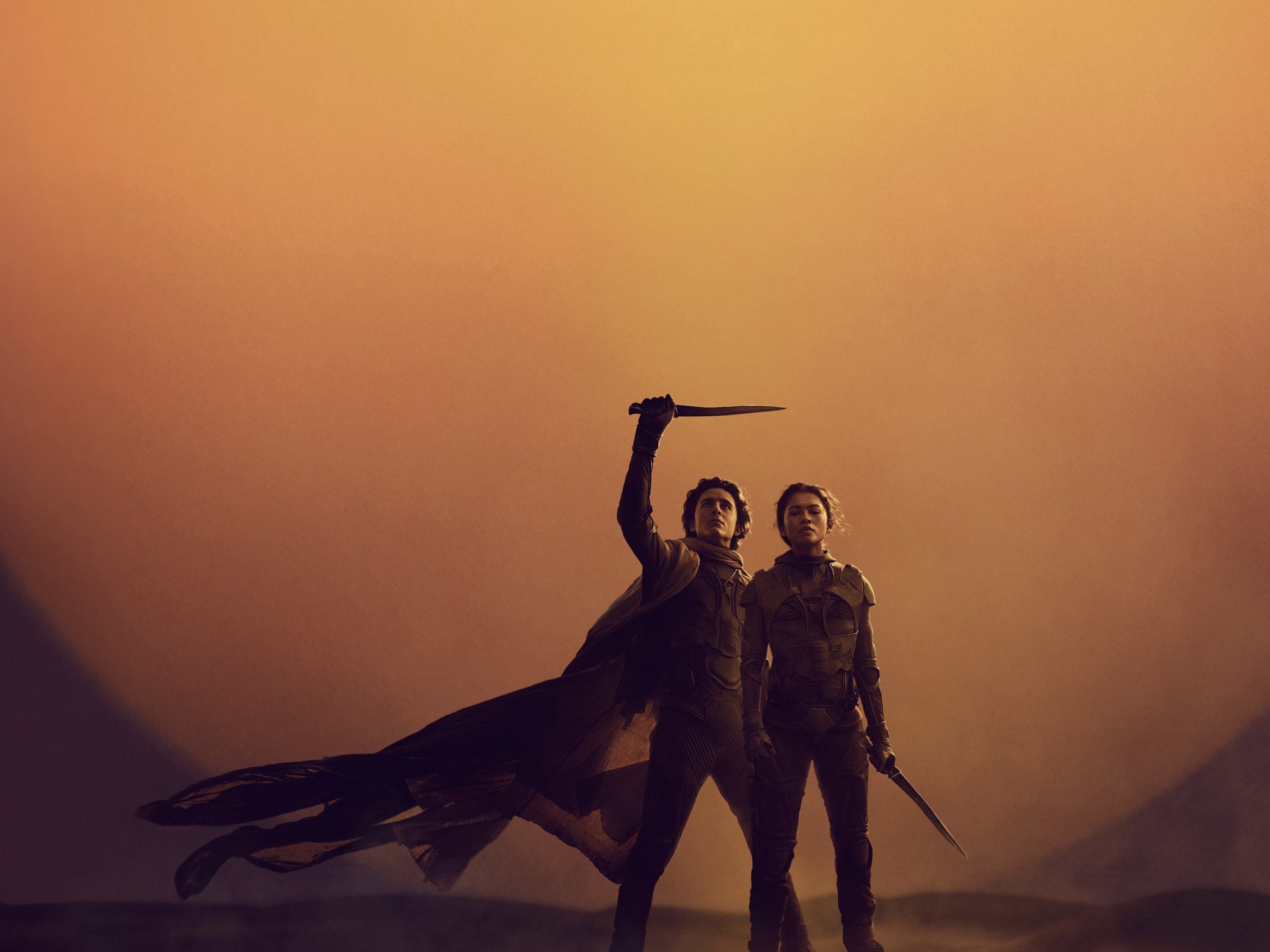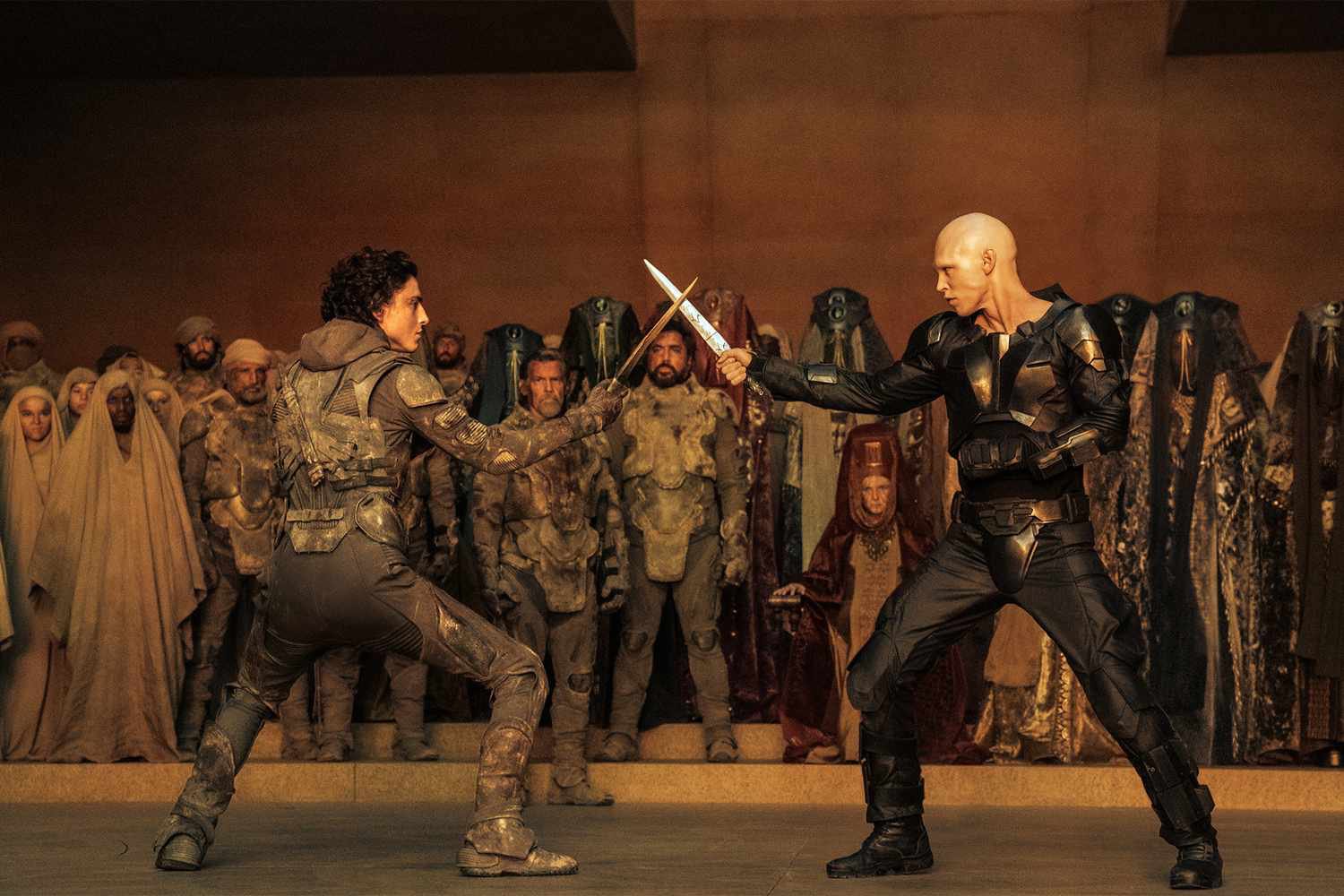Film Review — Dune: Part Two
DENIS VILLENEUVE’S DUNE: PART TWO IS A BLEAK, SCI-FI WONDER
Denis Villeneuve’s Dune: Part Two is a masterstroke of bleak, fantasy world-building that continues to translate Frank Herbert’s source material into a rousing epic. A genuine feat of adaptation and engineering that captures the very spirit of the novel’s overwhelmingly strange mythos and whetted knottiness, Dune: Part Two is sci-fi at its finest and most tragic. Minor spoilers ahead…
One of the most enduring critiques of 2021’s Dune is of its perceived sparseness, labeling the once “unfilmable” adaptation as a gorgeously engineered juggling act of Frank Herbert’s lugubrious mythmaking that’s all setup and no payoff: a true “part one” if there ever was one. Nearly three years later, however, Denis Villeneuve’s staggering Dune: Part Two proves to land every spectacular, brutalist tableau thrown in the air in 2021. The first film’s meticulous - and at times exhausting - assembly of dynastic lore and tangled history kept its characters in the shadows of its sprawling grandeur, but Part Two completes a vision by colliding dense sci-fi imagemaking with Herbert’s heady and prescient themes: the gravity of manufactured destiny, the untamable tendrils of belief, and a harrowing subversion of the hero’s journey.
Discarding the first film’s mysterious, undulating prelude for a new caption, Part Two lets us know it’s getting straight to business: “Power over spice is power over all.” Taking place precisely where 2021’s Dune left off, Part Two finds Paul Atreides (Timotheé Chalamet in top form) and his mother Lady Jessica (a sinister Rebecca Ferguson) on the run with the planet’s native Fremen. With his father dead and House Atreides’ grip on Arakeen shattered by sadistic House Harkonnen rivals, Paul acclimates to his freedom fighter hosts while growing his romance with fellow rebel Chani (Zendaya). Fremen leader Stilgar (Javier Bardem) is eager to accept the prodigal Atreides as the prophesied “Lisan al gaib” to deliver his people from Harkonnen oppression, but unbeknownst to the indigenous faithful, Jessica - as a Bene Gesserit priestess - has carefully massaged eugenics and thousands of years of local myth to suit her son and her sect.
“Denis Villeneuve’s staggering Dune: Part Two proves to land every spectacular, brutalist tableau thrown in the air in 2021.”
“The world has made choices for us.” Late in Dune: Part Two, Chani unearths its central tension as the two lovers try and resist the pull of destiny. Where Dune ends on an almost comically truncated cliffhanger, Villeneuve is now ready to detonate all the foundations conscientiously crafted three years ago. Catalyzing Herbert’s stark palace intrigue with the tragedy of inevitability, Part Two examines colonial conquest, messianic dangers, and the gravity of mass belief systems. The role of faith - and its meaning to different factions - is woven straight into the tapestry of the narrative: For the Fremen, “Lisan al gaib” is the savior foretold; for the Bene Gesserit, it’s a system of control and a tool of subjugation. And what of Paul himself? Hopped up on Arrakis’ otherworldly “spice” and the psychic powers it endows him, the young duke - channeled through Chalamet’s career-best performance - precariously wavers between his own horror at the tyrannical future he’s locked into and the intoxicating allure of empyrean power.
Dune has had a long, pained history on the screen. Alejandro Jodorowsky’s version remains an abandoned production and a Hollywood relic, David Lynch’s ambitiously incomprehensible 1984 film resulted in a notorious flop, and the 2000 miniseries - the bloated and faithful-to-a-fault Frank Herbert’s Dune - has the dubious honor from TOR.com as the “most okay adaptation.” Dune - by sheer number of failed iterations - has been called “unfilmable,” but its reputation as an impenetrable, esoteric art object has been greatly exaggerated. Leafing through Herbert’s prose, it’s quite clear that there’s plenty of Dune that is inherently cinematic, and Villeneuve - whose staunchest critics find him cold and clinical - is the perfect choice to bring Arrakis and its galactic oppressors to life. Not to throw around the word lightly, but Part Two is rife with sure-to-be iconic sci-fi imagery borne from DP Greig Fraser’s stunning compositions: Harkonnen troopers in an anti-gravity assault through the sands of the spice planet, the black sun and inverted fireworks of Giedi Prime, the demented-yet-honorable Feyd-Rautha’s (a slithering, committed Austin Butler) gladiatorial showdowns. Part Two also has Villeneuve shoring up his kinetic bonafides; a mid-film guerilla takedown of an ornithopter had the audience in my theater hollering, and for those who spent three years patiently waiting for some real sandworm action, I’m happy to report that Dune’s most infamous cryptids make multiple jaw-dropping appearances.
“Part Two is rife with sure-to-be iconic sci-fi imagery borne from DP Greig Fraser’s inspired compositions…”
Villeneuve, as a long time Dune-head, has called his adaptation the “project of his life.” Conveying an exuberant passion for the source material, his deep understanding of Herbert’s ideas shine through the surgical changes - some major, some subtle - required to bring the book to life. One such inspired choice is the translation of Alia - Paul’s sister - from insidious toddler to a sentient, psychic fetus; the change is made specifically for the screen, sidestepping the need for an awkward toddler actor while still preserving Herbert’s trademark peculiarities. However, not every reconfiguration of text is a good one: For a film so deft at upending white savior tropes and colonizer narratives, Dune’s lone, sore spot remains how eager it is to de-Islamize its Fremen people. Going so far as to hiring Game of Thrones conlanger David J. Peterson to create a fictional language to replace Herbert’s widespread use of Arabic, Part Two’s expected - but no less disappointing - brand of Hollywood cowardice aims to hobble its own themes.
Despite its missteps, Dune: Part Two remains a bracing achievement in science fiction imagemaking and the coalescence of a singular vision that started over three years ago. Transforming Herbert’s prose into a visual cauldron of weird mysticism, resistance warfare, and the tangle of resigned fates, Part Two dares to be an IP blockbuster that is knotty and bleak. As the final notes of Paul’s violent ascendency curdle from triumph to ominous portent, it all becomes crystal clear: Denis Villeneuve gets it. Bring on Messiah.








